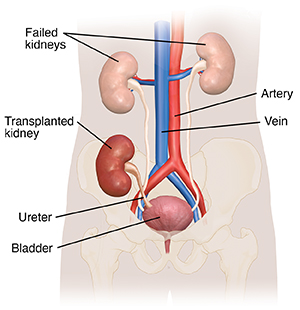Kidney Transplant
August 7, 2022A kidney transplant is the preferred treatment for kidney failure. It's a surgery to place a donated kidney into your body. This kidney takes over the job of filtering your blood. The transplant is the treatment closest to having your own healthy kidney.
Finding a new kidney
The new kidney may come from:
-
A living person (living donor)
-
A person who has recently died (deceased donor)
Living donor
This person does not have to be related to you. Their kidney must match your blood type and immune system. A person can safely donate a kidney as long as they are in good health and pass all the medical tests.
Living donor kidneys work much longer than deceased donor kidneys. For this reason, you are strongly encouraged to discuss this option with your friends and family.
Deceased donor
In these cases, permission is needed from the donor's family. There is a waiting list for kidneys from deceased donors ranging from months to years. This depends on your blood type.
Preparing for surgery
You must have a series of tests in the transplant center to make sure that you are eligible for transplantation.
-
Tests are done to make sure you don't have any serious infections, such as AIDS or hepatitis B.
-
Your vital organs, such as the heart and lungs, need to be working well. They must be able to withstand the surgery and the antirejection medicines.
-
A social worker will check your financial situation and social support.
-
Your body's immune system will try to damage the new kidney right away after the surgery. This is called acute rejection. Taking antirejection medicines right after the surgery can stop this.
-
Your healthcare provider will explain your roles and responsibilities with the new kidney. Your commitment is important to keeping the kidney healthy and working for a long time.
-
Your healthcare provider will discuss the possible complications of surgery. They will also talk about the possible side effects of the post-transplant medicines you will need to take.
-
Tests are also done to make sure that the donor kidney matches your body's blood type and immune system. This can prevent an acute rejection reaction after the transplantation.
The transplant surgery
-
The surgery usually takes about
3 to 6 hours. -
All kidneys are screened for disease before the transplant.
-
In most cases, your old kidneys will not be removed. This is because even failed kidneys release chemicals that help your body work.
-
The new kidney is placed in the lower part of your belly (abdomen) near your groin.
-
The new kidney is attached to nearby blood vessels. Blood can then flow through to be filtered.
-
The ureter is connected to your bladder to let urine flow out.
Recovering from surgery
You (and any living donor) will recover in the hospital after surgery. The donor may stay in the hospital for up to a week. You may stay longer. Your new kidney may start to work right away, especially if it's from a living donor. Or it may take a few weeks if it's from a deceased donor. You will be given instructions about what to do and what not to do while you’re healing.
After your surgery
You will need to take antirejection medicines to keep your body from rejecting your transplanted kidney. You will need these for the rest of your life as long as your kidney is working. Your healthcare team will discuss possible side effects of these medicines with you. You will need to monitor your health for signs of kidney rejection. These include:
-
Less urine output
-
Fever
-
Pain at the site of your new kidney
-
Weight gain
-
Blood testing
Notes to the living donor
Here are some things to know before donating a kidney:
-
You can only donate if your blood type is compatible with the recipient's blood type. Other types of matching will also be done. The testing process may require a hospital stay of 24 to 48 hours.
-
You will be given a full medical checkup to be sure you are healthy enough to donate.
-
Your kidney is usually removed by a laparoscopic method, using a few small incisions. In some cases, an open procedure is used. This requires a longer incision. Recovery time is generally longer after an open procedure.
-
If you have one kidney removed, the other kidney will take over and keep you healthy. Talk with your healthcare provider about the possible complications of surgery.
-
Some of the costs of donating a kidney are covered by the recipient's insurance. Talk with the social worker or business office to get detailed cost and insurance information.
The need for kidneys for transplantation continues to increase, but the number of kidney living and deceased donors has not changed. If you want to donate a kidney when you die, contact the Human Resources and Services Administration at www.organdonor.gov for more information. Additional information can also be found at the United Network for Organ Sharing at www.transplantliving.org .
